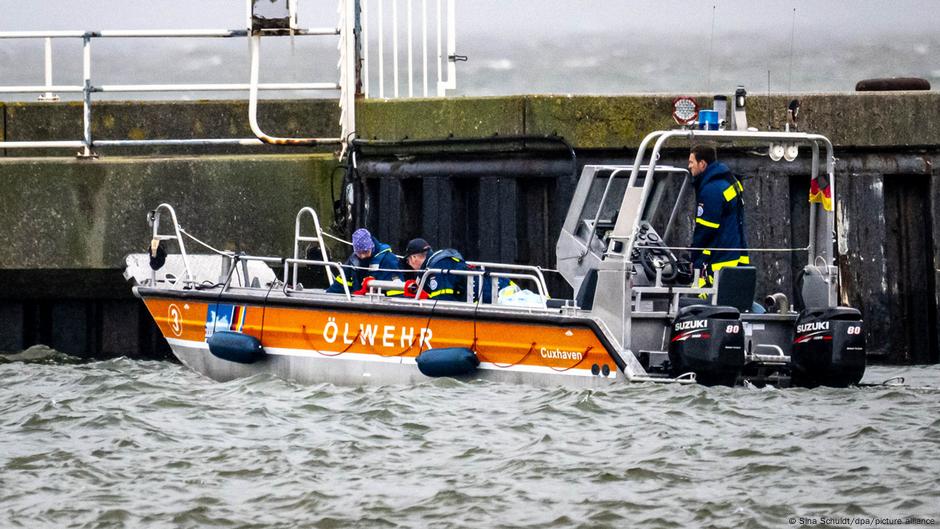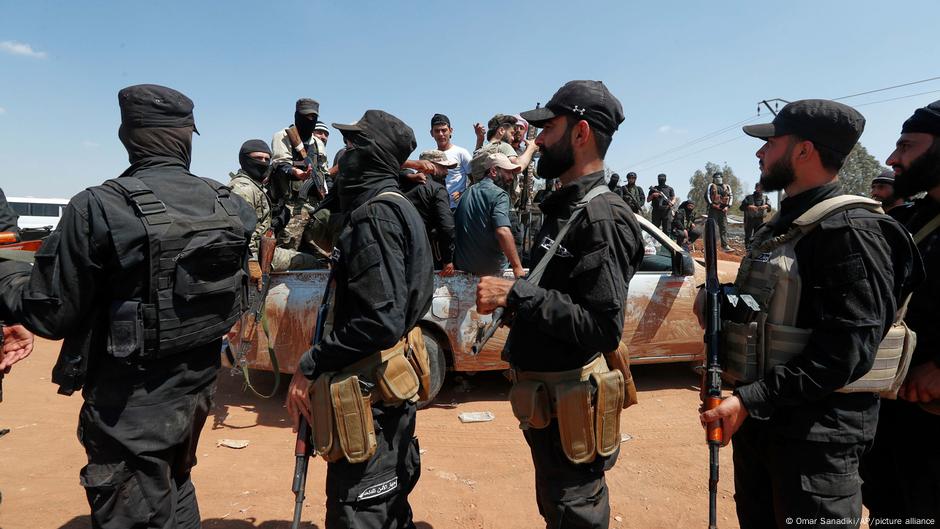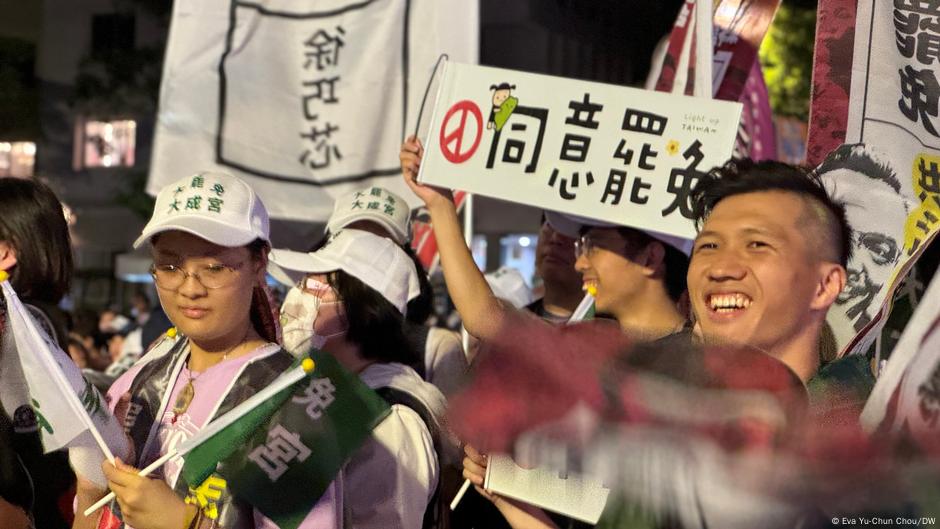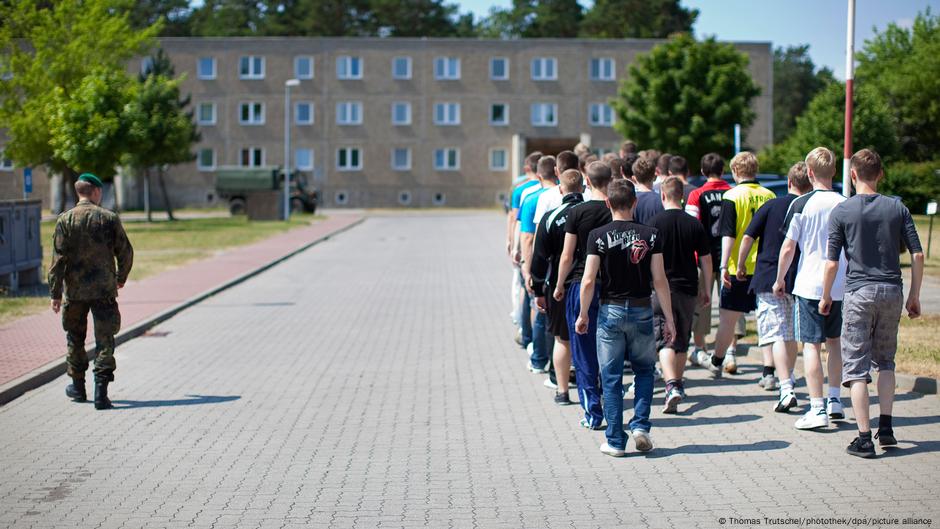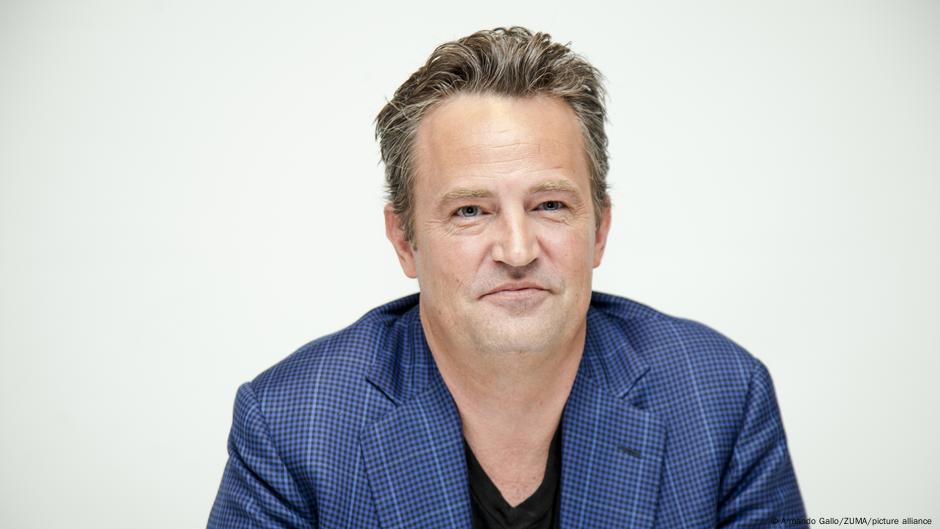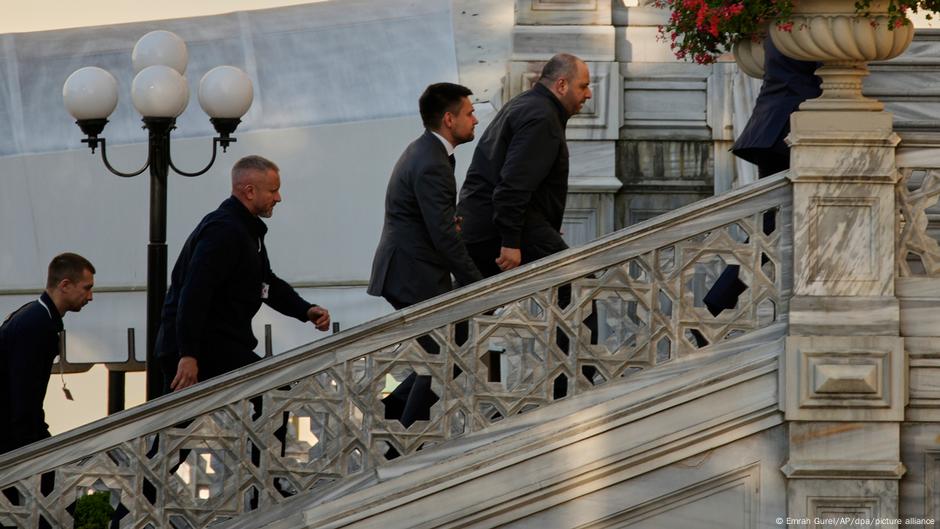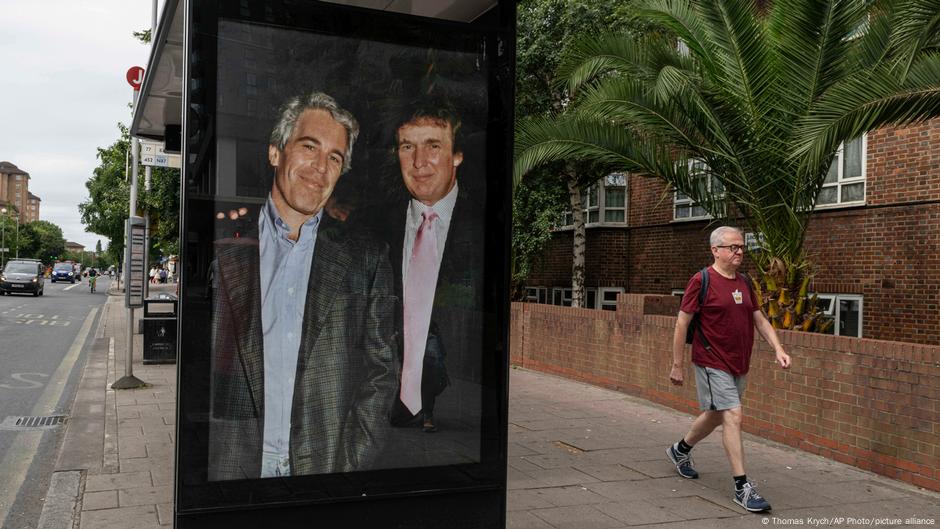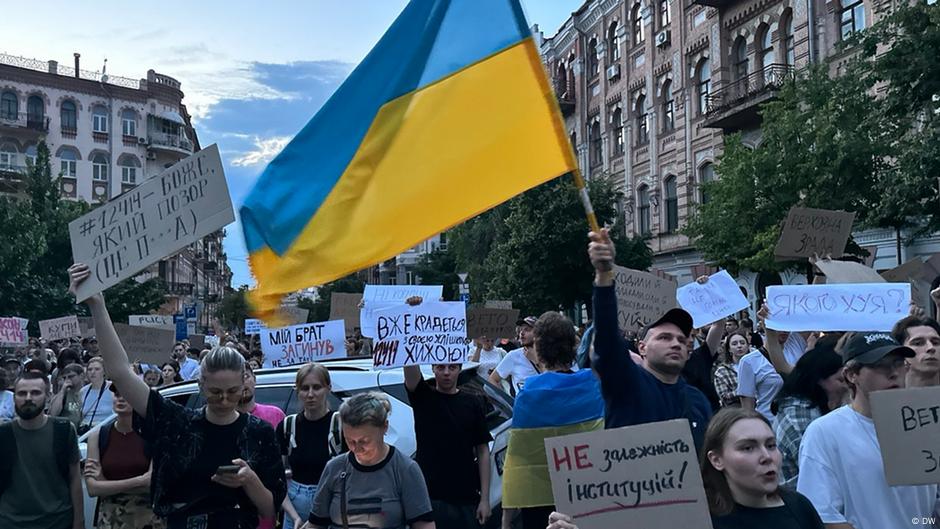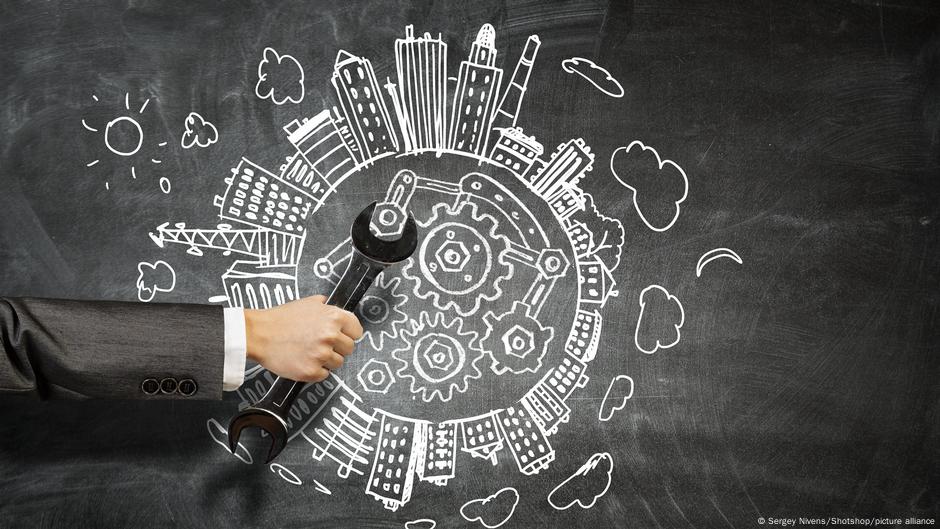The 69-meter tanker Capella and the 44-meter offshore supply ship Coastal Legend crashed near the port entrance. Officials said cleanup efforts are ongoing, while a nature group warned that the consequences of the spill could be dire.
In Berlin, German Chancellor Friedrich Merz is meeting with French President Emmanuel Macron as their countries aim to boost their partnership amid troubled trans-Atlantic ties.
Here’s a roundup of stories, backgrounders and analysis on events in or connected with Germany on Wednesday, July 23:
Skip next section Germany’s Merz signals ‘decisions’ on EU-US trade row07/23/2025July 23, 2025
Germany’s Merz signals ‘decisions’ on EU-US trade row
Both Merz (L) and Macron spoke of the EU-US trade ties ahead of a bilateral meeting in BerlinImage: Michael Kappeler/dpa/picture alliance
German Chancellor Friedrich Merz said there “may be decisions” on the ongoing trade row between the European Union and the United States since US President Donald Trump introduced his controversial tariffs earlier this year.
Speaking alongside French President Emmanuel Macron in Berlin, Merz said: “We will discuss some very current issues together, including the current trade policy, about which we are hearing in these minutes that there could possibly be decisions.”
Macron said he would coordinate with Merz and other European counterparts on how to respond to the incoming US tariffs.
“Today, we are responding to the tariff offensive that has been launched with a determination that we share: to provide stability and have the lowest possible tariffs,” he said ahead of his meeting with Merz.
https://p.dw.com/p/4xvjlSkip next section Germany moves to fast-track weapons purchases07/23/2025July 23, 2025
Germany moves to fast-track weapons purchases
Dmytro Hubenko Editor
Germany’s cabinet has approved a draft law to accelerate arms procurement for the military, Defense Minister Boris Pistorius has said, calling it a “quantum leap” for national security.
The bill is designed to cut red tape and allow the Bundeswehr to buy weapons and equipment faster and with fewer bureaucratic hurdles.
Read more about how Germany is moving to fast-track weapons purchases.
https://p.dw.com/p/4xvZxSkip next section Ship collision triggers oil spill at North Sea port07/23/2025July 23, 2025
Ship collision triggers oil spill at North Sea port
An estimated 6,000 liters (1,585 US gallons) of oil have spilled into waters in the German North Sea port of Cuxhaven following a collision between two ships, the Central Command for Maritime Emergencies (CCME) said on Wednesday.
“We currently estimate that there are 6,000 liters of oil,” a CCME spokeswoman said. “There has been more oil in the port before. But every drop of oil we have in the water is too much.”
Emergency personnel from the Federal Agency for Technical Relief (THW) and the fire department set up oil booms to contain the spill. The crew was reportedly uninjured, and shipping traffic on the Elbe River was not affected by the operation.
The collision between the 60-meter (nearly 200-foot) tanker Capella and the offshore supply vessel Coastal Legend on Wednesday morning.
After initial investigations, the water police believe the tanker’s captain misjudged the circumstances. “We have no indications of a technical fault,” said a police spokeswoman. The extent of the material damage is still unclear.
The German Nature and Biodiversity Conservation Union said the situation was serious. “Oil doesn’t belong in the water, and with several thousand liters, the risk of serious ecological consequences increases significantly,” said a spokesperson.
https://p.dw.com/p/4xtkESkip next section Germany clears Eurofighter jet sale to Turkey07/23/2025July 23, 2025
Germany clears Eurofighter jet sale to Turkey
Germany has approved the export of Eurofighter jets to Turkey, ending a lengthy delay.
Government spokesman Stefan Kornelius confirmed an earlier Spiegel report, adding that the defense ministry had sent written confirmation of the decision to the Turkish government.
The Spiegel news magazine had reported earlier that the German government had greenlit the delivery of 40 Eurofighter Typhoon jets to Turkey.
Turkey had long been involved in negotiations to buy Eurofighter Typhoon jets, which are built by a consortium of Germany, Britain, Italy and Spain, through the companies Airbus, BAE Systems and Leonardo.
The magazine said the decision was made by Germany’s Federal Security Council, whose approval is needed for arms exports.
Soon after the Spiegel report, Turkey and Britain signed a memorandum of understanding for Ankara to buy the fighter jets.
Imprisoned Turkish opposition leader Ekrem Imamoglu was reportedly among those who appealed to Berlin to sell Ankara the jets, saying “Turkey is bigger than Erdogan.”
A report in the Handelsblatt newspaper in April stated that then caretaker Chancellor Olaf Scholz had been blocking the export.
https://p.dw.com/p/4xtIZSkip next section Berlin says no rift in coalition government over position on Israel07/23/2025July 23, 2025
Berlin says no rift in coalition government over position on Israel
Richard ConnorThorsten Frei (right) who is Chancellor Friedrich Merz’s top aide, said the coalition was unitedImage: picture alliance/dts-Agentur
German Chancellery Minister Thorsten Frei has dismissed concerns of a rift within Germany’s coalition government over its position on Israel.
A split emerged after Berlin opted not to join dozens of Western countries in signing a condemnation of the “inhumane killing” of Palestinian civilians in Gaza.
Matthias Miersch, the SPD’s parliamentary leader, praised the signatory states, including Germany’s “closest partners such as France, Canada and Austria,” for sending “a clear signal.”
Frei, from the Christian Democrats, said that disagreements about how to achieve the government’s goals did not mean did not mean that the coalition was not united.
“There’s not even a sheet of paper between the partners,” said Frei, who is Merz’s top aide.
Read the full story on the disagreements within the German coalition government over its stance on Gaza.
https://p.dw.com/p/4xu9cSkip next section Germany’s FM Wadephul says Zelenskyy’s anti-corruption law change hampers Ukrainian EU aspirations 07/23/2025July 23, 2025
Germany’s FM Wadephul says Zelenskyy’s anti-corruption law change hampers Ukrainian EU aspirations
German Foreign Minister Johann Wadephul told German news outlet Bild that Ukrainian President Volodymyr Zelenskyy’s move to remove the independence of two key anti-corruption bodies hampers Ukraine’s path to EU membership.
Zelenskyy has often expressed that one day he would like Ukraine to join the 27-member European Union.
“The restrictions on the independence of the Ukrainian anti-corruption authorities hampers Ukraine’s path to the EU,” Wadephul said. “I expect Ukraine to continue its fight against corruption consistently.”
Zelenskyy signed off on legislation that would put the National Anti-Corruption Bureau of Ukraine (NABU) and Specialized Anti-Corruption Prosecutor’s Office (SAPO) under the direct purview of Ukraine’s prosecutor general. The Ukrainian prosecutor general was appointed by Zelenskyy.
Zelenskyy’s support of the legislation has sparked the first widespread anti-government demonstrations in Ukraine since the start of Russia’s invasion in February 2022.
The Ukrainian leader met with Ukrainian anti-corruption and security agencies in a meeting on Wednesday.
Bild reported Wadephul spoke with Ukrainian Foreign Minister Andrii Sybiha on Wednesday and urged the Ukrainian side to keep up anti-corruption efforts.
https://p.dw.com/p/4xuN3Skip next section Germany’s defense minister Pistorius urges Trump admin assurance on Patriots for Ukraine07/23/2025July 23, 2025
Germany’s defense minister Pistorius urges Trump admin assurance on Patriots for Ukraine
German Defense Minister Boris Pistorius called for US President Donald Trump’s administration to provide “watertight” assurances in regards to Patriot air-defense systems for Ukraine.
Pistorius told German news outlet Spiegel that Germany and its NATO allies need guarantees that US-manufactured Patriot systems delivered to Ukraine would be replaced within a timeframe of about six to eight months.
Pistorius’s comments come after Trump said European NATO countries could buy weapons from the US, which could then be delivered for Ukraine to defend itself amid Russia’s invasion.
The US is seeking for Germany and other European countries to send Patriot systems to Ukraine first from their own stocks. Then, the US would send replacement Patriot systems to European allies.
This arrangement has led to concern from Germany as Pistorius told Spiegel it would be necessary that “the countries transferring systems continue to meet their NATO requirements and that no security gaps arise for NATO.”
Earlier this week, Germany said it would “contribute to providing” five Patriot missile defense systems to Ukraine.
https://p.dw.com/p/4xuN1Skip next section German shadow economy booms amid high taxes and state aid07/23/2025July 23, 2025
German shadow economy booms amid high taxes and state aid
Thomas KohlmannUndeclared work is increasingly lucrative in Germany despite the risk of getting caugthImage: picture-alliance/dpa
While Germany’s economy falters, the country is experiencing a rise in undeclared work.
What role do taxes and generous state aid for the poor play in the surge?
Read the full story on Germany’s booming shadow economy.
https://p.dw.com/p/4xu41Skip next section Comedian ‘El Hotzo’ cleared of charges over Trump posts07/23/2025July 23, 2025
Comedian ‘El Hotzo’ cleared of charges over Trump posts
A court in Berlin has acquitted comedian Sebastian Hotz of charges that he had condoned a criminal offense with online posts after last year’s assassination attempt against Donald Trump.
He also later wrote that he found it “absolutely fantastic when fascists die.”
The posts were clearly recognizable as satire, Judge Andrea Wilms said as she handed down her verdict, adding that she could not discern any intention to disturb public order.
She said she did not believe that anyone would feel incited to commit a crime after reading such obviously satirical statements.
Hotz posted this photo on X celebrating his acquittal.
https://p.dw.com/p/4xtsbSkip next section Tasers set to be approved for police use07/23/2025July 23, 2025
Tasers set to be approved for police use
Tasers can be lethal in certain casesImage: Axel Heimken/dpa/picture alliance
A new draft law that is expected to receive Cabinet approval on Wednesday will allow German federal police officers to carry and use Tasers, a device used to deliver electric shocks at a distance to incapacitate a target.
The German DPA news agency cited the draft as saying: “Law enforcement officers must have access to the full range of operational and command resources in order to act effectively and proportionately.”
The document stressed that the use of firearms should remain a last resort, saying that Tasers represented “a more graduated use of force.”
Interior Minister Alexander Dobrindt had previously announced plans to equip the federal police with the devices, whose use is controversial, as it can lead to death in cases of people with heart or circulatory conditions, for example.
The electric shocks they deliver via thin electric wires cause painful muscle contractions that prevent those “tased” from being able to move freely.
Tasers have already been approved for use by law enforcement personnel in some German states.
https://p.dw.com/p/4xtIVSkip next section Merz set to host France’s Macron at dinner meeting07/23/2025July 23, 2025
Merz set to host France’s Macron at dinner meeting
Merz has vowed to strengthen ties between Germany and FranceImage: Kay Nietfeld/dpa/picture alliance
German Chancellor Friedrich Merz is set to receive French President Emmanuel Macron in Macron’s first visit to Germany since Merz’s government took power in early May.
The dinner will take place at Villa Borsig, a lakeside residence on Lake Tegel that now serves as a guest house of the German Foreign Office.
The two leaders have said they want to deepen cooperation “at all levels” after Franco-German ties cooled somewhat under former German Chancellor Olaf Scholz.
The agenda is likely to focus on ways of strengthening European unity in the face of what seems to be waning US interest in the continent under US President Donald Trump.
Talks could also center on the issue of a potential nuclear shield, with France the only country in the EU to possess a nuclear arsenal.
However, the two countries also disagree on several matters, with France, for example, in favor of taking on joint European debt to boost the continent’s defense industry, an idea opposed by Berlin.
https://p.dw.com/p/4xtG0Skip next section German comedian goes on trial for posts on attempted Trump assassination07/23/2025July 23, 2025
German comedian goes on trial for posts on attempted Trump assassination
The trial of Hotz, 29, is being seen as a test of how far satire can go in GermanyImage: Steffen Proessdorf/foto2press/IMAGO
German comedian Sebastian Hotz goes on trial in Berlin on Wednesday on charges of having condoned criminal offenses with online remarks on the assassination attempt on Donald Trump last year.
At the time, Hotz, better known under his stage name of “El Hotzo,” compared Trump and the “last bus,” saying both had “unfortunately” just been missed.
Both postings were later deleted, but screenshots of the statements circulated widely.
Regional public broadcaster RBB ended its collaboration with Hotz on a youth program amid growing public scrutiny, while national public broadcaster ARD Kultur canceled a literary event with him.
The journalists’ association DJV called on Tuesday for legal action against Hotz to be stopped, saying it was “completely excessive” that the satirist was coming before a court and facing a possible jail sentence.
Trump was wounded in one ear after a shooter fired a number of bullets from an assault rifle at him during a campaign event in the US state of Pennsylvania last July.
A firefighter watching the rally was killed and two others seriously injured during the shooting incident.
The shooter was also shot and killed.
https://p.dw.com/p/4xt1RSkip next section Court rejects AfD complaint against "suspected extremist" label07/23/2025July 23, 2025
Court rejects AfD complaint against "suspected extremist" label
A top German court has upheld the assessment of the far-right Alternative for Germany (AfD) party by the domestic intelligence agency as a “suspected right-wing extremist” group.
Tuesday’s ruling by the Leipzig federal administrative court on the assessment is final.
It upholds a May 2024 ruling by a higher administrative court in Münster justifying the assessment on the grounds that there was enough evidence suggesting anti-democratic tendencies in the party’s platform.
Among other things, the Münster court said, that there was a “justified suspicion” that a considerable part of its membership was in favor of degrading the legal status of German citizens “with migration backgrounds.”
The classification by Germany’s domestic intelligence agency, the Federal Office for the Protection of the Constitution (BfV), of the AfD and its now disbanded youth wing makes it possible for the party to be monitored by all legal means.
These include recruiting undercover informants from among the party’s ranks.
The BfV’s “suspected” assessment was upgraded in May to a “confirmed” classification, but that has been suspended pending a court ruling that might take years to be issued.
However, some of the AfD’s regional branches are already being monitored as “confirmed” extremist by intelligence agencies in individual German states.
The AfD is the strongest opposition party in the German lower house of parliament, the Bundestag.
https://p.dw.com/p/4xswgSkip next section Welcome to our coverage07/23/2025July 23, 2025
Welcome to our coverage
Timothy Jones | Elizabeth Schumacher Editor
The DW newsroom in Bonn wishes all our readers guten Morgen on Wednesday, July 23!
We will be reporting on a meeting between German Chancellor Friedrich Merz and French President Emmanuel Macron as the two leaders seek to bolster their countries’ partnership at the heart of the European Union amid a myriad of challenges.
The evening will also see another momentous European encounter as Spain plays Germany in the Women’s European Championship semifinals in Zurich days after the German team snatched a dramatic win over France.
DW will bring you reports, analyses and explainers on these and other stories to keep you up to date with all the topics currently in focus in Germany.
https://p.dw.com/p/4xswyTimothy Jones Writer, translator and editor with DW’s online news team.Richard Connor Reporting on stories from around the world, with a particular focus on Europe — especially Germany.Send us your feedback
Sursa: DW
